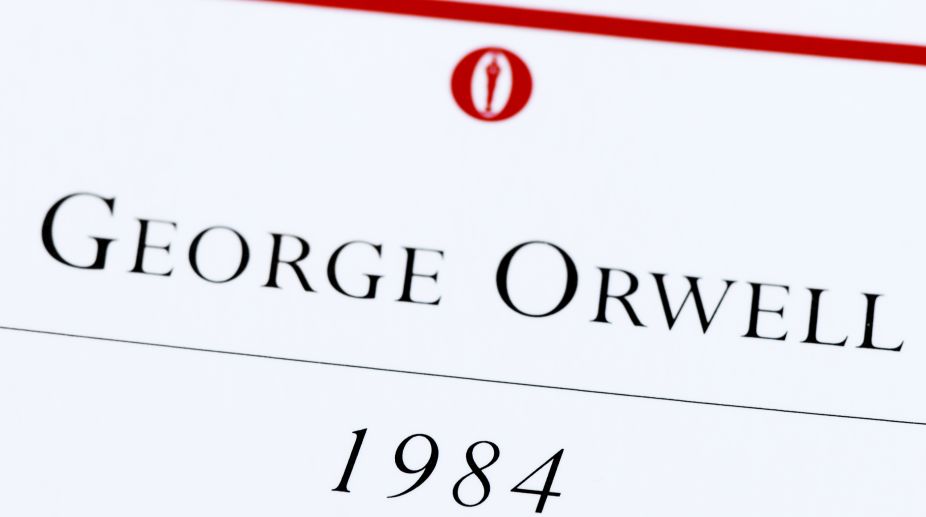Sudha Devi Nayak
Orwell’s ‘1984’ published in 1949 is a novel about dystopian times, his vision of a frightening future where humans are no longer human, being above or below the pale of humanity and defying what constitutes as ‘humanity’.
A book that has graced several high school syllabi, imperfectly understood by young readers, today has become a symbol of the times we are passing through. The propaganda, the internal surveillance, the authoritarian politics, the doublespeak, that seemed to pervade the fictional state of Oceania, seems to be in order today in totalitarian hierarchies masquerading as democracies. Democracies that stifle dissenting notes and obliterate individuality reduce their citizens to assenting robots to the powers that be.
Winston Smith, the doomed protagonist, a 39-year-old living in a miserable apartment building that smells of ‘boiled cabbage’, works in the Ministry of Truth that propagates falsehoods, where history is daily rewritten, records destroyed and reality fabricated according to the will of the State. Overseeing him is the image of the Big Brother from billboards, hoardings, banners, posters, wrappings, ‘every commanding corner’ and even private tele screens. There are no private moments, every detail of one’s life is under the scalpel. In despair, Winston tries to maintain a diary of his innermost thoughts all the time fearing the consequences and attempts to find out what life was like before Big Brother but no one seems to remember.
The State is in a constant state of warfare with neighbouring nations and the contradictions in the pithy slogans mouthed by the citizens — “War is Peace, Ignorance is Strength, Freedom is Slavery,” — are the result of doublethink which is the power of holding contrary beliefs in one’s mind simultaneously and accepting both. The lingua franca of the State is Newspeak, no longer the Oldspeak, the language spoken hitherto, where archaic use of language and form is dispensed with, new words are created with more precision, old meanings violated and new vocabularies built as sole means of communication in speech and writing. The literature of the past would be destroyed and Chaucer, Shakespeare, Milton will only exist in Newspeak but differently. At the heart of the novel is a love story, a romance that dares to flower even in such dire conditions between Winston and Julia and they experience that purity of emotion in sylvan surroundings amidst the music of birdsongs in the woods. The idyll ended when the lovers were discovered by the Thought Police and bundled off for interrogation and inquisition. After tortuous encounters with his inquisitors Winston still holds on to his freedom for dissent and individuality and his enduring belief that it is impossible to found a civilisation on fear and hatred and cruelty. However after endless mental and physical torture he gives in, even betraying his lover Julia, as writhing on the floor, he feels “in the face of pain there are no heroes, no heroes.” He confesses to everything he has done or not done and “He became a mouth that uttered, a hand that signed whatever was demanded of him.”
He is told categorically “There will be no loyalty except loyalty towards the Party. There will be no love except the love of Big Brother. There will be no laughter except the laugh of triumph over a defeated enemy. There will be no art, no literature, no science.” After the painful process of indoctrination is over Winston emerges reincarnated admitting to himself that he has indeed strayed, the struggle was over and he loves Big Brother.
Yet in the midst of despair and hopelessness the glimmer of humanity in Winston shines through his love for Julia, whom though he betrays he does not stop loving which in itself he feels is not an act of betrayal. His fond memories of his mother and his efforts to recall happier times are evidence of this. There was a time “What mattered were individual relationships, and a completely helpless gesture, an embrace, a tear, a word spoken to a dying man could have value in itself.” These feelings in Winston and his resistance to all that is evil in spite of the fact he succumbs to it is what still holds hope for the future of humanity.
Winston’s world is not too far from our own world today where we are fighting our own demons of racism, casteism and violence, discrimination, corruption and lawlessness, conflict of ideologies and majoritarianism without conscience.
